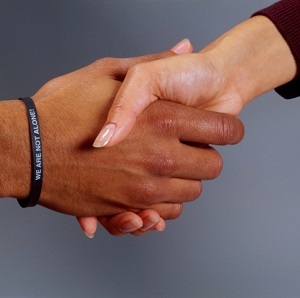 We are taught from the earliest of ages that good communication is imperative. In both subtle, and direct ways, we are taught to be competitive when we communicate. Simultaneously, we are told to be cooperative. What an impossible task–to be cooperative and competitive at the same time.
We are taught from the earliest of ages that good communication is imperative. In both subtle, and direct ways, we are taught to be competitive when we communicate. Simultaneously, we are told to be cooperative. What an impossible task–to be cooperative and competitive at the same time.
The conundrum we are all faced with has its roots in two complex social environments: those having hierarchy structures, and those which do not. Hierarchical institutions include schools, our family of origin, the family we create, workplaces, churches and government as the most common. Within those institutions we learn the power of the politics and practice of competitive communication.
Part and parcel of those systems we learn the power of being right, winning, and fighting for what we believe in. It is from within those hierarchical environments we learn that debate and argumentation can propel us up the ladders of success. Within hierarchies we learn the art of both direct and indirect communication. Whether or not we decide to learn or participate in competitive communication processes are very much dependent upon the degree to which we are conflict averse or not. The less conflict averse we are, the more direct our communications tend to be. The more conflict averse, communications may be less direct.
The one opportunity we have for a non-hierarchical relationship is our marriage/partnership with our significant other. This is where, as I mentioned above, social environments become complex. The intimate partners’ relationship is one that functions best when not hierarchical. Problem is, by the time we reach significant other intimate relationships we have cut our communication teeth on competitive communication principles, techniques and lessons. Therefore, we will likely employ them with our intimate partner, often ineffectively, sometimes with disastrous outcomes.
Therefore, is there any reason we should not be having the relationship troubles we have given this backdrop? We grow up being taught how, when, why and where to be competitive in our communications–just about everywhere. We are told to be cooperative, but are taught with competitive means. Furthermore, we understand the politics of hierarchical relationships far better than non-hierarchical relationships. That in turn, leaves us ill prepared for marriage/committed relationships, the one non-hierarchical intimate relationship we might develop. Adding to the confusion is the fact that we create our own family, which clearly is a hierarchy, with the non-hierarchy of the partnership/marriage at its core.
What’s the answer? Consciousness. First, each individual in a couple, particularly those couples with children, must become consciously aware of the differences between competitive and cooperative communication. Second, put effort toward understanding how to create a non-hierarchical relationship in practice, not just theory.Third, where children are involved, make an effort to practice cooperative communication principles between yourselves as parents as an example for children to emulate. Fourth, correct the communication between the children when they are in conflict with each other and with you. Recognize their tendency to be competitive, and teach them the language of cooperation instead.
Below is a short version breakdown of each style; judge for yourself which one you think might work best for you in a non-hierarchical relationship, that is, your marriage or committed relationship, especially when conflict is involved. And remember, a conflict is a difference–not a fight! A fight is what breaks out when conflict is mismanaged.
Competitive Communication:
- Adversarial: you vs me
- Winners and losers
- Objective is to win vs being happy
- Objective is to be right vs being happy
- No resolution
- Builds distance between partners
- No room for negotiation
- Fundamentally rigid/inflexible
Cooperative Communication:
- You each work together for common goals
- No individual winners or losers- both “win”
- Objective is to understand each others’ experience
- Objective is to learn about the other and ones self
- Resolution is paramount
- Builds intimacy and closeness
- Fundamentally flexible and open
Now, discuss these two very different styles with your partner just to see what you each think about the differences, and which one, or blend of the two, you each tend to employ. Next, explore the model your parents used when they were in conflict, and see if you can determine how what they did might have affected how you operate in your current relationship.

The preceding article was solely written by the author named above. Any views and opinions expressed are not necessarily shared by GoodTherapy.org. Questions or concerns about the preceding article can be directed to the author or posted as a comment below.



